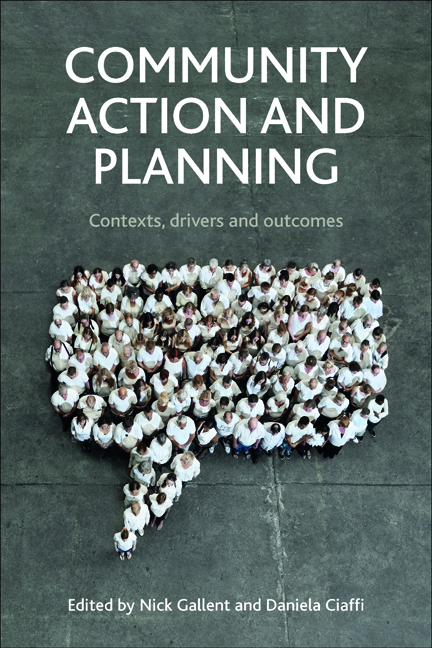16 - Connecting to the citizenry? Support groups in community planning in England
Published online by Cambridge University Press: 04 March 2022
Summary
Introduction
Politicians in many industrialised nations have sought to connect more directly to the citizenry, accepting that the needs of communities are ever more complex and diverse (Rittel and Webber, 1973; see also Amdam, Chapter 15, this volume) and that, in response, planning and service delivery need to become increasingly sophisticated, crosssectoral and collaborative endeavours (Marsh and Rhodes, 1992). Such collaboration is not always easy to achieve. Those operating in the traditional ‘public’ (that is, within government) and ‘non-public’ realms (that is, voluntary, private and community actors) have tended to form their own discrete groupings, with the former coalescing into ‘policy communities’ and the latter into ‘interest groups’, with only weak connectivity between the two (Marsh et al, 2009, 621).
This weak connectivity, and the means of overcoming it, provides the focus for this chapter. The observation of Marsh et al (2009) is generally that traditional policy communities have their own ways of working, or operational protocols (operating in Habermas's ‘system world’: see van der Pennen and Schreuders, Chapter 8, this volume). Moreover, they connect most easily with professional networks and qualified individuals. In contrast, the ‘interest groups’ bring together non-experts and actors, who feel unconstrained by legal frameworks and who pursue agendas that serve local interests and ambitions. The former operate in the framework of democracy: their role is often to give expert and impartial advice to elected representatives, who make decisions and take actions on the back of it. The latter, on the other hand, are part of a governance shift that has, in recent decades, challenged representative democracy and the professionalised model of government, of which closed policy communities are an integral part. Owen et al (2007, 50–1) argue that democracy and governance are diametrically opposed concepts. The former is ‘top-down’, rooted in ‘representative authority’ and achieves its ends through mandated power. It places great weight on a strategic perspective (arguing the case for a broader public good) and its modus operandi is through local authorities, as the instruments of change, who work in partnership with other professional agencies. The local authorities provide accountability while their partners – in fields such as economic development and housing – bring additional expertise to bear on complex problems that the authority alone is unable to resolve.
- Type
- Chapter
- Information
- Community Action and PlanningContexts, Drivers and Outcomes, pp. 301 - 322Publisher: Bristol University PressPrint publication year: 2014



